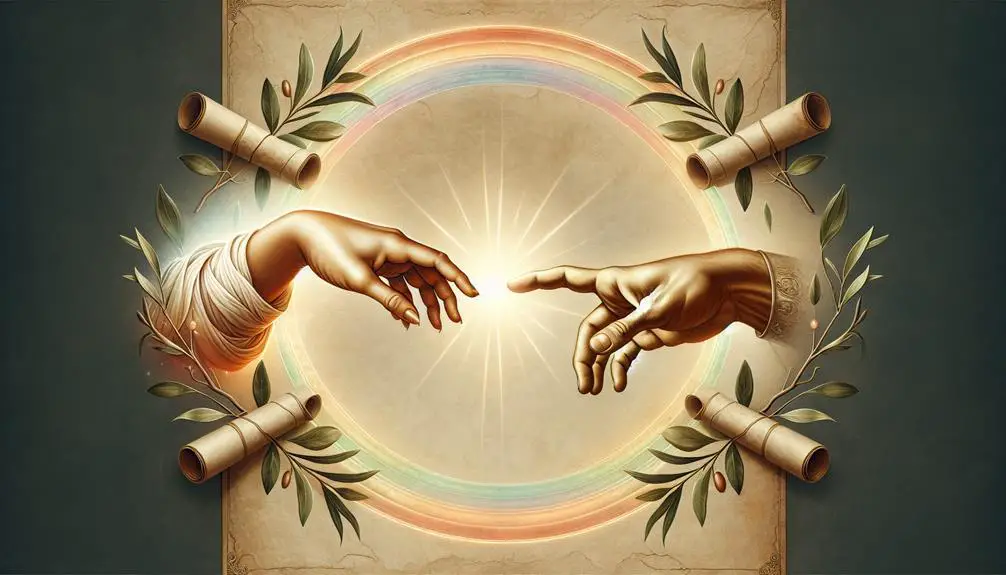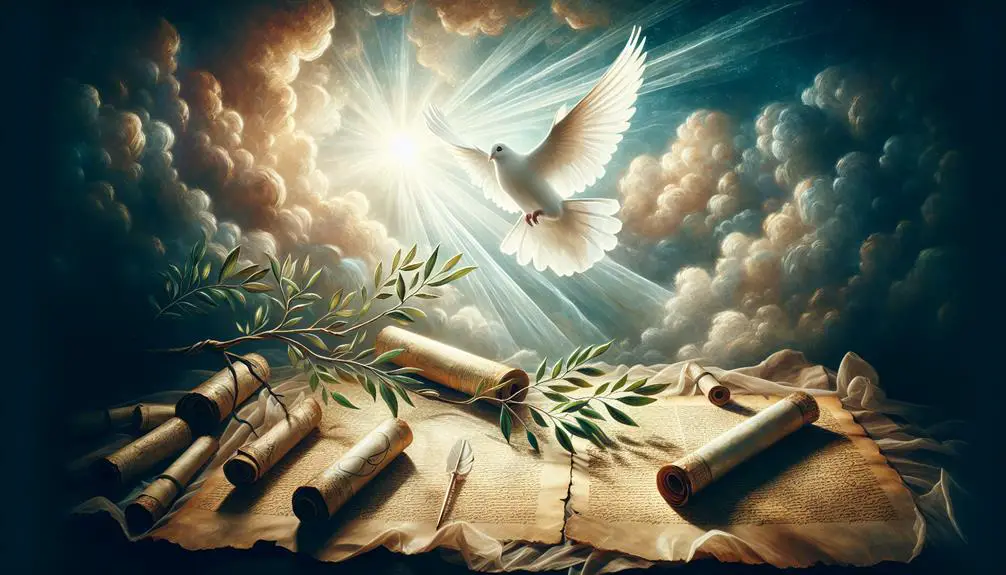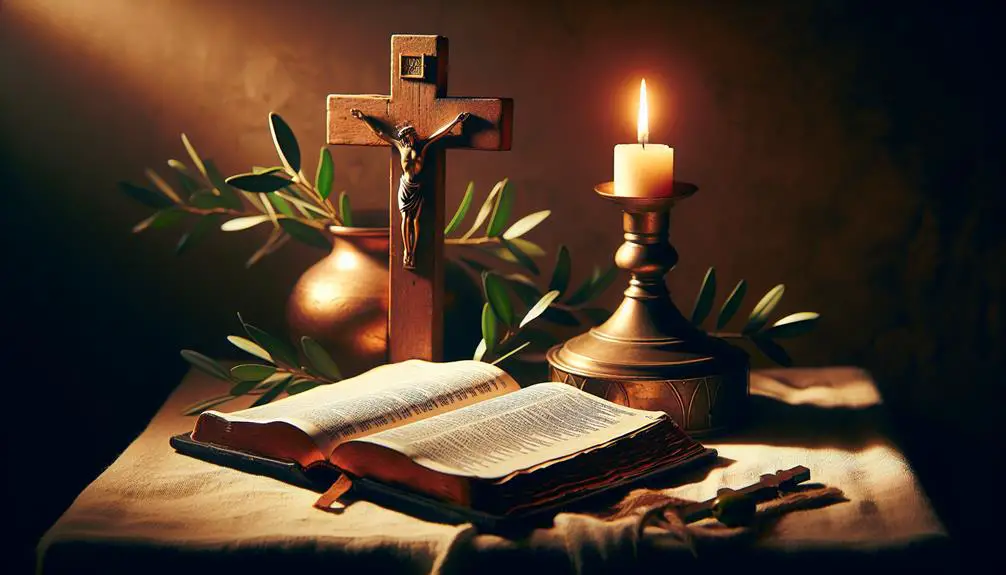Witness how ancient biblical espousal teachings illuminate modern love and commitment, inviting a deeper exploration of timeless relationships.

Espoused in the Bible
You're navigating the digital age, yet the concept of espousal in the Bible remains as relevant as ever. Through ancient texts, you'll discover how marriage and divine covenants are intertwined, offering insights into love, commitment, and faithfulness that transcend time.
The scriptures present sacred unions and allegories that speak to the human heart, urging a deeper understanding of devotion. As you explore these biblical narratives, you'll find yourself questioning how these age-old teachings can apply to modern relationships.
What lessons can be gleaned from these spiritual partnerships, and how might they inform your views on commitment and love today?
Key Takeaways
- The Bible portrays marriage as a divine covenant, reflecting God's commitments through sacred rituals and legal frameworks.
- Prophetic narratives, like Hosea's story and Christ as the bridegroom, symbolize the enduring covenant between God and His people.
- Biblical teachings advocate for love, commitment, and faithfulness as universal standards for relationships.
- Marriage norms and ethics in the Bible, including discussions on polygamy, evolve to guide societal views and marital practices.
The Concept of Marriage

Within the biblical context, marriage is fundamentally viewed as a divine covenant, established by God to unite a man and a woman in a lifelong, exclusive partnership. This sacred bond isn't merely a social contract but a spiritual commitment that mirrors God's unwavering fidelity to humanity. As you delve into the Scriptures, you'll uncover that marriage rituals and their legal aspects are intricately woven into the fabric of biblical teachings, reflecting the solemnity and sanctity of this union.
Marriage rituals in the Bible are multifaceted, encompassing various ceremonies that symbolize the covenantal nature of this union. From the betrothal, which signifies the initial agreement between families, to the marriage feast, which celebrates the consummation of the marriage, each step is imbued with deep spiritual significance. These rituals aren't arbitrary but are designed to reflect the covenantal relationship between Christ and the Church, highlighting the depth of commitment and love expected in marriage.
The legal aspects of marriage in the biblical narrative are equally compelling. Scripture delineates specific rights and responsibilities for both husbands and wives, ensuring the protection and respect of each party within the covenant. For instance, the laws concerning marriage in the Books of Moses provide a framework for marital fidelity, inheritance rights, and the just treatment of wives and children. These legal stipulations underscore the importance of justice, love, and mutual respect within the covenantal relationship, serving as a divine blueprint for marital harmony and societal stability.
In essence, the concept of marriage in the Bible transcends human institutions, embodying a divine covenant marked by sacred rituals and governed by God's laws. This spiritual framework elevates the union of man and woman, setting a profound standard for love, commitment, and faithfulness.
Divine Covenants Explained

What exactly are divine covenants, and how do they serve as the foundational agreements between God and humanity in the biblical narrative? You've likely encountered the term "covenant" while exploring the rich tapestry of biblical stories. These covenants aren't merely agreements; they're sacred bonds, woven through the fabric of history, where divine promises meet human commitment. Understanding these covenants sheds light on the historical context and the covenant rituals that mark these profound moments of faith.
Covenant |
Historical Context |
Covenant Ritual |
|---|---|---|
Noahic |
Post-Flood Renewal |
Rainbow as the sign |
Abrahamic |
Patriarchal Era |
Circumcision |
Mosaic |
Exodus from Egypt |
Passover |
Davidic |
Monarchy in Israel |
Promise of an everlasting kingdom |
These covenants serve as the structural beams of biblical theology, each one building upon the other, from the promise of a new beginning with Noah to the eternal kingdom promised to David. The rituals associated with these covenants, such as circumcision for the Abrahamic covenant and the Passover for the Mosaic covenant, underscore their gravity and the seriousness with which they were entered into. These rituals aren't mere formalities; they're profound acts of faith, signifying deep commitments between God and humanity.
As you delve deeper into these divine covenants, you'll appreciate how they're not just historical footnotes. They're living, breathing promises that continue to influence faith and understanding today. Through these covenants, God's faithfulness and humanity's response are eternally entwined, offering a glimpse into the divine plan that unfolds across the ages.
Espousal in Prophecy

Having explored the foundational divine covenants, let's now examine how biblical prophecy incorporates the theme of espousal, revealing deeper layers of God's relationship with humanity. The prophets didn't just foretell future events; they communicated God's espousal to His people within specific prophetic timelines and cultural contexts, enriching our understanding of this divine relationship.
In the prophetic books, espousal imagery often serves as a powerful metaphor for God's covenant relationship with Israel. For instance, Hosea's life—a prophet commanded to marry a prostitute—mirrors this relationship, illustrating God's unwavering commitment despite Israel's infidelity. This narrative isn't a simple historical account; it's a divine espousal drama set against the backdrop of Israel's cultural context, offering profound insights into God's grace and mercy.
Moreover, prophetic timelines reveal the enduring nature of this espousal. From Isaiah's promises of restoration to Jeremiah's vision of a new covenant, these prophecies aren't just temporal predictions but declarations of an everlasting union. They encapsulate the idea that, despite periods of unfaithfulness, God's commitment remains steadfast, akin to a spouse's unwavering love.
This espousal motif extends beyond the Old Testament. In the New Testament, Christ is portrayed as the bridegroom, with the Church as His bride—a culmination of prophetic espousal imagery. This isn't merely a continuation of a theme but an unveiling of its ultimate expression within the Christian faith context.
Love and Commitment
At the heart of biblical teachings, love and commitment emerge as fundamental principles guiding the divine-human relationship and its reflection in human interactions. You'll find that these virtues aren't just lofty ideals but are deeply embedded in the fabric of scriptural narratives, offering a blueprint for relationships that transcend time and culture.
Diving deeper, you'll recognize that romantic expressions within the Bible aren't mere reflections of human affection but are symbolic of a larger covenantal relationship between the Creator and His creation. These expressions, while sometimes influenced by the cultural norms of the times, still resonate with a timeless quality, underscoring the universality of love and commitment.
You're invited to consider how cultural influences have shaped the understanding and expression of these virtues over millennia. Yet, despite these variations, the core message remains unaltered: love is patient, love is kind, and it bears all things. This enduring message suggests that the essence of love and commitment, as depicted in biblical teachings, transcends cultural boundaries, offering a universal standard for relationships.
Analyzing these themes, you'll uncover that the Bible doesn't just advocate for love and commitment in romantic relationships but extends this mandate to all forms of human interaction. It's a reminder that your interactions are to be seasoned with love, marked by unwavering commitment to one another, mirroring the divine example.
In essence, the biblical narrative invites you to view love and commitment not as mere emotional states but as deliberate choices, underpinned by faith, reflecting the divine in everyday life.
Sacred Unions in Scripture

Exploring sacred unions in scripture reveals how these partnerships aren't only foundational to biblical narratives but also serve as divine models for human relationships. The Bible doesn't shy away from complex topics, including the polygamy debates or the evolution of matrimonial laws, showing a dynamic understanding of what it means to be united in the eyes of God.
In the context of scripture, sacred unions are multifaceted, embodying principles of love, respect, and mutual support. However, they also reflect the societal norms and legal structures of their times. This juxtaposition invites believers to consider the core values that should define relationships, regardless of changing societal norms.
- Polygamy Debates: Scripture contains narratives that address the practice of polygamy, offering a lens through which to view the evolution of matrimonial norms and ethics within a faith context.
- Matrimonial Laws: The Bible outlines various laws and guidelines related to marriage, serving as a foundation for contemporary matrimonial practices and debates within faith communities.
- Divine Models: Sacred unions in scripture often symbolize broader spiritual truths, portraying the relationship between God and humanity or the ideal of unity in diversity.
- Societal Norms: The depiction of marriage in the Bible reflects and addresses the societal norms of the times, providing a historical context for understanding the evolution of marriage as an institution.
Analyzing sacred unions in scripture through a scholarly, faith-based lens allows for a deeper understanding of how these relationships serve as both a reflection of and a model for human relationships, navigating through the complexities of polygamy debates and the establishment of matrimonial laws.
Faithfulness and Devotion

Building on the understanding of sacred unions, it's crucial to examine the roles of faithfulness and devotion as central tenets of these relationships within biblical teachings. You'll find that these virtues are not merely personal choices but are deeply embedded in the fabric of moral integrity and spiritual growth. They're presented not just as ideals but as expected practices that reflect one's commitment to God and to one another.
Faithfulness in the Bible is often linked with steadfastness and reliability. You're called to be faithful not only to God but also to the people around you. This fidelity is a reflection of God's unchanging nature. Devotion, on the other hand, is about the dedication and love you show towards God and His creation. It's about setting aside your own desires and comforts for the sake of higher principles and for the service of others.
Virtue |
Biblical Importance |
|---|---|
Faithfulness |
Seen as a reflection of God's own faithfulness. |
Devotion |
Demonstrates love and commitment to God and His commandments. |
Achieving moral integrity requires you to practice these virtues in every aspect of your life, leading to spiritual growth. This growth is not just about personal enlightenment but about creating a community that upholds these values. By embodying faithfulness and devotion, you become a testament to the transformative power of living according to biblical principles. These virtues guide you in navigating the complexities of relationships while maintaining a clear moral compass and deepening your connection with the divine.
Espousal as Allegory

Delving into the concept of espousal as allegory, it becomes clear that biblical narratives often use marriage to symbolize the deep, covenantal relationship between God and His people. This metaphorical usage not only enriches the text but also bridges cultural contexts, allowing readers across generations to grasp the profound nature of divine commitment and love.
In the Bible, the allegorical interpretations of espousal reveal several key themes:
- Covenant and Commitment: Marriage as an allegory underscores the binding, unbreakable covenant between God and His followers, echoing vows of fidelity and mutual commitment.
- Purity and Holiness: The call for the Church to be the pure and holy bride of Christ emphasizes the sacredness of the relationship, urging believers to live in righteousness.
- Redemption and Restoration: The marital allegory often encompasses themes of redemption, portraying God's relentless pursuit and restoration of His wayward people, akin to a faithful spouse.
- Intimacy and Community: It illustrates the intimate relationship God seeks with His people, highlighting the communal aspect of faith where believers are united as one body in Christ.
The espousal allegory, rich in cultural and spiritual significance, serves as a profound tool for understanding the depth of God's love and the nature of His covenant with humanity. By exploring these allegorical interpretations, you delve deeper into the heart of biblical teachings, uncovering layers of meaning that resonate with the human experience of love, commitment, and community. Through this lens, the scriptures offer a timeless message of divine fidelity and grace, transcending cultural and historical boundaries to speak directly to the soul.
Frequently Asked Questions
How Do Different Christian Denominations Interpret Biblical Espousal and Its Implications for Modern Marriage Practices?
Different Christian denominations interpret pre-marital counseling and covenant symbolism in various ways, impacting modern marriage practices.
You'll find that some view pre-marital counseling as essential, preparing couples for a covenant that mirrors biblical principles.
Others emphasize the symbolic nature of a covenant, seeing marriage as a sacred bond that reflects deeper spiritual truths.
These interpretations shape how denominations approach marriage, highlighting its significance beyond a mere legal agreement.
Are There Any Specific Biblical Espousal Customs or Traditions That Have Been Discontinued or Significantly Transformed in Contemporary Christian Weddings?
Absolutely, many wedding customs have undergone a complete makeover.
For example, dowry practices, once a staple in marriages, are now almost extinct, reflecting societal shifts.
Similarly, matchmaking roles, traditionally held by family members, have dramatically evolved with modern dating methods.
These transformations illustrate a significant departure from past traditions, underscoring how contemporary Christian weddings adapt, balancing tradition and modernity in a faith-based, analytical manner.
How Does the Concept of Espousal in the Bible Compare to Marriage Customs in Other Major World Religions During the Same Historical Period?
You'll find that espousal in the Bible shares similarities and differences with Hindu Samskaras and the Islamic Nikah during the same historical period.
While all emphasize commitment and spiritual significance, Hindu Samskaras involve elaborate rituals symbolizing various life stages, and Islamic Nikah focuses on contractual aspects and mutual consent.
These customs reflect each religion's unique perspective on marriage, highlighting a blend of spiritual, communal, and personal elements in forming matrimonial bonds.
What Are the Psychological and Social Impacts of Adhering to Biblical Principles of Espousal in Today's Society?
You're navigating a complex landscape when you align with traditional espousal values today. Imagine standing at a crossroads, where individual autonomy and financial independence beckon from one path, while deep-rooted communal and spiritual connections call from another.
This adherence can foster a sense of belonging and identity, yet it may also challenge your autonomy and economic freedom. Analyzing this, you'll find a delicate balance between personal growth and societal expectations.
Can the Principles of Espousal Found in the Bible Offer Guidance or Solutions to Common Marriage Issues in the 21st Century, Such as Divorce Rates and Marital Dissatisfaction?
Absolutely, the principles you're exploring can offer guidance for common marital issues today. By focusing on financial management and communication techniques, you're tapping into core aspects that often lead to divorce and dissatisfaction.
These principles encourage open dialogue and shared responsibility, which are crucial for a healthy relationship. They not only promote understanding and patience but also provide a solid framework for addressing and resolving conflicts effectively.
Conclusion
In essence, the Bible's teachings on espousal illuminate a profound spiritual journey, intertwining divine covenant, love, and unwavering commitment.
Consider the allegory of Hosea and Gomer, where Hosea's love mirrors God's unfailing love for His people, despite their transgressions. This story exemplifies the depth of divine espousal, showcasing a relationship built on faithfulness and devotion.
Through such narratives, Scripture invites you to explore the sacredness of unions, urging a reflection on your spiritual bond with the divine.



Sign up